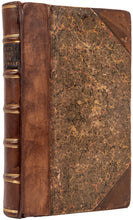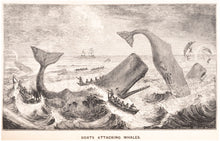BEALE, Thomas. The Natural History of the Sperm Whale ... To Which is Added, A Sketch of a South-Sea Whaling Voyage. London, John van Voorst, 1839.
12mo. Contemporary half-calf over marbled boards, rebacked ; pp. [iii]-vi, 393, frontispiece and 2 plates, wood-engraved illustrations in the text; wear to corners, bound without half-title; internally remarkably clean and fresh.
Very rare revised and enlarged second edition of 1839. 'From its first appearance Beale's book has been recognised as an essential reference for studies of whales and whaling. It provides for the sperm whale and the British Southern whale fishery, a handbook similar to that supplied for the Greenland Right whale and the Northern whale fishery by William Scoresby junr in his An Account of the Arctic Regions [...] Beale was one of the first observers, if not the first, to provide an accurate description of the sperm whale's appearance, habits, and general biology' (p. v in the 1973 reprint). The work is also notable for providing one of the primary sources used by Melville in the composition of the whaling scenes in Moby Dick.
Chavanne 1006; Denucé 1254; Sabin 4108; Spence 105.
Provenance: Posthumous bookplate Brian Birley Roberts inside front cover, his signature on opposite fly-leaf. Brian Burley Roberts, inspired as a child by reading Raymond Raife's The Quest for the Arctic Poppy, became a Polar ornithologist, researcher anf the father of the Antarctic Treaty. 'While an undergraduate, he organized and led the Cambridge University Expedition to Vatnajokull in Iceland in 1932 and the Cambridge University Expedition to Scoresby Sund in East Greenland in 1933. Roberts joined the British Graham Land Expedition, 1934-1937 (leader John Rymill), as an ornithologist, spending the austral winter of 1935 at the Argentine Islands and, after an operation to remove his appendix, the following winter on South Georgia where he studied Antarctic birds and elephant seals … In 1946, he joined the Scott Polar Research Institute in Cambridge, as a part-time research fellow' (https://archiveshub.jisc.ac.uk).
#2118252



